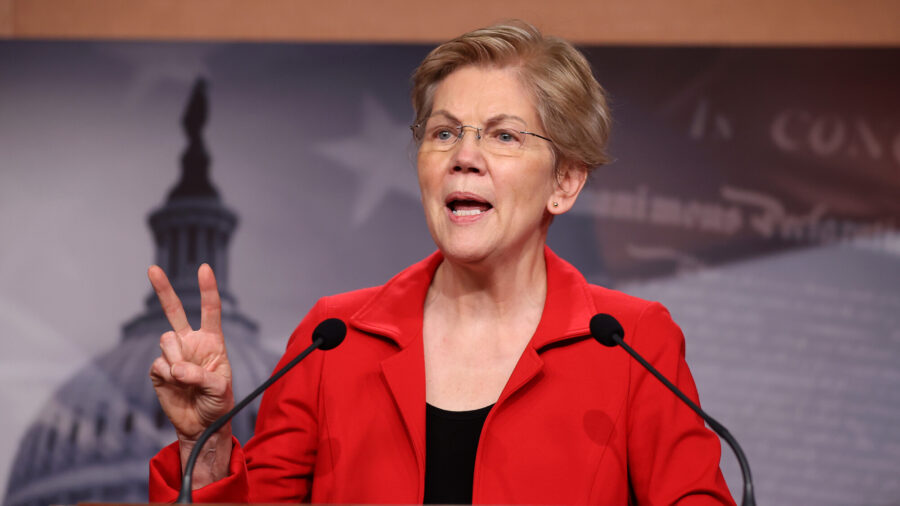A group of Democrats on Monday unveiled a bill that they say would impose a 2 percent tax on U.S. households with fortunes over $50 million to help pay for childcare, rebuilding infrastructure, and health reforms in the United States.
The Ultra-Millionaire Tax was introduced by Sen. Elizabeth Warren (D-Mass.), alongside Reps. Pramila Jayapal (D-Wash.) and Brendan Boyle (D-Pa.), and aims to “level the playing field and narrow the racial wealth gap” by asking the wealthiest 100,000 households in the United States to “pay their fair share,” a press release from Warren’s office states.
“We need to turn to infrastructure, childcare, pre-K, college. We need to turn to the things that create investment and opportunity going forward and to do that, a wealth tax is the best way to pay for it,” Warren, who has long been a proponent of the wealth tax, told reporters during a press briefing.
The proposed Ultra-Millionaire Tax would require American households and trusts valued at between $50 million and $1 billion to pay a 2 percent annual tax. All fortunes valued over $1 billion would be hit with a 3 percent annual tax.
Warren in 2019 unveiled a similar proposal as she vied for a 2020 Democratic presidential nomination.
“As Congress develops additional plans to help our economy, the wealth tax should be at the top of the list to help pay for these plans because of the huge amounts of revenue it would generate,” Warren said in a statement.
The proposal hasn’t been backed by President Joe Biden, however, Warren has on multiple occasions said that it would contribute to supporting his “Build Back Better” agenda.
“A #WealthTax provides money for President Biden’s #BuildBackBetter agenda,” she said on Twitter Monday. “Policies like expanding the caregiving economy—everything from child care to nursing homes—rebuilding infrastructure, high quality k-12 education, and tuition-free public college and technical schools.”
The three Democrats claim the proposal is estimated to generate “at least $3 trillion in revenue over 10 years.”
In their release, the group cites a Feb. 24 analysis from University of California-Berkeley economists Emmanuel Saez, director of the Center for Equitable Growth, and Gabriel Zucman.
However, according to analysis published in The New York Times from other experts, including the University of Pennsylvania’s Natasha Sarin and Harvard’s Lawrence H. Summers, the proposal would generate significantly less.
The pair in an op-ed said that while Saez and Zucman are leading experts on wealth statistics, this is the first time they have been involved in tax-revenue estimation.
“The richest 1% have 35% of America’s wealth. The richest 0.1% have 18% of America’s wealth. The richest 130,000 families have nearly as much wealth as the bottom 117 million families COMBINED. It’s time for the rich to finally pay their fair share,” Jayapal said in a Twitter post.
The proposed tax would “level the playing field for middle class families and others,” Boyle said on Twitter.
“The ultra-rich and powerful have rigged the rules in their favor so much that the top 0.1% pay a lower effective tax rate than the bottom 99%, and billionaire wealth is 40% higher than before the COVID crisis began,” Warren added in a statement. “A wealth tax is popular among voters on both sides for good reason: because they understand the system is rigged to benefit the wealthy and large corporations.”
Critics of the lawmakers’ proposal question whether it is permitted by the U.S. Constitution. They also say the federal government would have difficulty calculating and enforcing the tax, and that would in turn discourage investment.
Warren has defended her proposal’s constitutionality, pointing to estate taxes as precedent for wealth evaluation.
“I am completely confident that this is a constitutionally responsible way to do this,” Warren told reporters. “We have included in the package, multiple letters from scholars who are confident that there are no constitutional issues here.”
In October 2020, then-President Donald Trump said during an NBC town hall that if Biden were to raise taxes on the ultra-wealthy, “all those companies that are coming in, they will leave the U.S. so fast your head will spin.”
While the president is yet to officially endorse a wealth tax, White House press secretary Jen Psaki noted on Monday that Biden will, as part of the next package of legislation, ensure wealthy Americans “pay their fair share.”
“Addressing the inequities in the tax code is something he talked about as part of the Build Back Better agenda and something he remains committed to,” Psaki said. “He has a lot of respect for Senator Warren and is aligned in the goal of making sure the ultra-wealthy and big corporations finally pay their fair share.”


